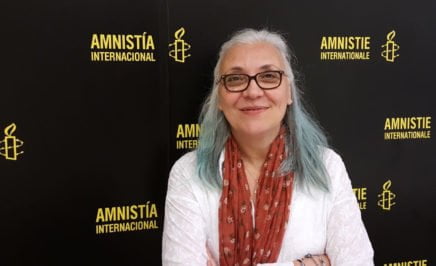The Istanbul Convention was created to help prevent and combat violence against women and domestic violence. It is the gold standard and it can save the lives of millions of women and girls.
Violence against women in Europe, including domestic violence, is rife. One in five women in the EU have experienced some form of physical and/or sexual violence from a current or previous partner from the age of 15.
Lockdowns during the Covid-19 pandemic have exacerbated the exposure of women and girls to abusive partners and family members and revealed the gaps in states’ responses to it.
The Council of Europe Convention on preventing and combating violence against women and domestic violence, also called the Istanbul Convention, is a ground-breaking treaty that provides a clear roadmap on how states can and must work towards a region free from gender-based violence.
Ironically, Turkey, the first country to sign the Convention on 11 May 2011, has now decided to leave it, with disastrous consequences for millions of women and girls and for organisations providing vital support to survivors of sexual and domestic violence.
The Istanbul Convention can save lives. Here’s why:
It is the ‘gold standard’ for preventing and combating violence against women and domestic violence.
The Istanbul Convention is the most far-reaching international treaty specifically designed to tackle violence against women and domestic violence. It sets out minimum standards for governments in Europe on prevention, protection, and prosecution of violence against women and domestic violence.
The Convention includes obligations for states to set up protection and support services to respond to violence against women, such as an adequate number of shelters, rape crisis centres, free 24/7 helplines, psychological counselling and medical care for survivors of violence, among other requirements. It also calls on the authorities to ensure education on gender equality, sexuality, and healthy relationships.
The Istanbul Convention is a legally binding instrument (State parties to it have an obligation to comply with its provisions). Globally, it is the third regional treaty addressing violence against women and the most comprehensive one after the Inter-American Convention on the Prevention, Punishment and Eradication of Violence against Women (Convention of Belém do Pará) adopted in 1994 and the Protocol to the African Charter on Human and Peoples’ Rights on the Rights of Women in Africa (Maputo Protocol) in place since 2003.
It offers protection to all women and girls without discrimination.
A key element of the Istanbul Convention is theobligation it places on States to implement its provisions without discrimination on any grounds to ensure no one is left behind. Lesbian, bisexual, trans women and intersex people who face deeply rooted prejudices and hostility all over Europe are therefore entitled to protection and redress under this treaty as well as everyone who is subjected to domestic violence.
Significantly, the Istanbul Convention has specific provisions for refugee and migrant women and girls. For instance, it introduces the possibility of granting migrant women who are survivors of domestic violence an autonomous residence permit when their residence status depends on that of their abusive partner.
It also requests governments to recognise gender-based violence against women as a form of persecution within the meaning of the 1951 Refugee Convention and a criterion to be considered when women and girls seek international protection in Europe.
It focuses on dismantling prejudices and stereotypes.
Violence against women is deeply rooted in the unequal power relations between women and men in societies. In addition, prejudices, gender stereotypes, and harmful practices perpetuate the idea that women are inferior to men. These are compounded for many women who experience intersectional discrimination on the grounds of, for instance, race, ethnicity, caste, class age, disability, gender identity, sexual orientation, religion, marital status and/or other characteristics. Against these harmful beliefs, the Istanbul Convention sends a clear message: there is no excuse for violence and abuse. Governments should put in place preventive measures to change attitudes and dismantle gender norms shaped by harmful stereotypes, and discriminatory cultural patterns that can in turn result in individuals and societies condoning or accepting violence against women.
The Convention draws on the definition of violence against women as violence directed against a woman because she is a woman or that affects women disproportionately. Although less often, men also experience some forms of violence within the domestic sphere and the Convention encourages governments to recognise this violence and apply its provisions to all victims of domestic violence regardless of their gender or gender identity.
It is a widely accepted human rights instrument
The drafting of the Istanbul Convention was possible following a common understanding among many States and civil society that violence against women in Europe is pervasive and that a set of harmonised measures would ensure that survivors everywhere were able to benefit from the same level of protection. The Convention establishes additional provisions that go beyond national frameworks providing an additional level of protection.
Amnesty International was one of many organisations that participated in the elaboration of the treaty that was opened for signatures on 11 March 2011. It entered into force on 1 August 2014.
Contrary to what is sometimes perceived, a great majority of the Council of Europe States have endorsed the Convention. It has been signed by more than 40 European states and the EU as a whole and ratified by 34 of them. In 2018 alone the Convention entered into force in nine countries (Croatia, Cyprus, Germany, Estonia, Greece, Iceland, Luxembourg, North Macedonia, and Switzerland) and in 2019 Ireland also ratified the treaty.
There is nothing controversial about the Istanbul Convention
There is ‘no hidden agenda’ to the Istanbul Convention; its sole purpose is to prevent and combat violence against women and girls, and domestic violence. However, misinformation campaigns about the term “gender” and spurious allegations by certain governments and interest groups that the Conventionundermines the notion of the “traditional family” are resulting in a few countries failing to ratify the Convention.
For example, Parliaments in Slovakia and Hungary have rejected initiatives to ratify the Convention and in Bulgaria, the country’s Constitutional Court has ruled that the Convention is not compatible with its Constitution.
In March 2021, Turkey, the first country to sign and ratify the Convention, announced its withdrawal from it, also arguing that it was being used to ‘normalise homosexuality’, which is ‘incompatible with Turkey’s social and family values’. If the Turkish authorities do not reverse it, the decision will take effect on 1 July 2021. Paradoxically, Turkey was a leading supporter of the Convention at the time of its opening for signatures and was instrumental in mobilising other European States to sign up to it.
Turkey’s unprecedented move follows similar threats in Poland where there is a pending request by the Prime Minister to the Constitutional Tribunal to assess the constitutionality of the treaty and a bill in Parliament calling on the President to withdraw Poland from the Istanbul Convention and to create a new convention on the “rights of the family”.
The Convention is becoming a tool in the hands of interest groups to spread misinformation and demonise gender equality and women’s and LGBTI people’s rights. Contrary to what governments in these countries argue, the real threat to “family values”, which, of course, are held dear by countless LGBTI people, are the perpetrators of gender-based and domestic violence. In 2019, the Venice Commission, an advisory body to the Council of Europe, issued an opinion assessing the constitutional implications of the ratification at the request of the Minister of Justice of Amenia, which provides a very useful analysis debunking many misconceptions about the treaty.
It is a lifesaving instrument that is making a difference
Women’s groups and allies in many countries have successfully campaigned against violence against women using the Istanbul Convention as a benchmark. Ironically, in countries where misinformation about the Convention is being spread – including Turkey and Poland- people have come together to fight for it,prevent violence against women and campaign for gender equality.
As a result, change is happening. For example, in Finland funding of shelters for survivors of domestic violence was understood to be a state responsibility thanks to the Istanbul Convention, ensuring moreservices and support. Finland and other countries such as Albania, Serbia and Montenegro have set up national helplines coinciding with the entry into force of the Convention.
In addition, in the past few years, Iceland, Sweden, Greece, Croatia, Malta and Denmark have reformed their laws to ensure that rape is defined as sex without consent, as required by the Convention. In Sweden, the law has so far resulted in a significant increase in convictions and, to a lesser degree, in prosecutions.
The reality is that no country is free from violence against women and there is a long way to go to achieve long-lasting change. But governments that sign and ratify the Convention are implementing measures to stop this and sending a strong message to the world that there is political will to protect women’s rights and save lives.



